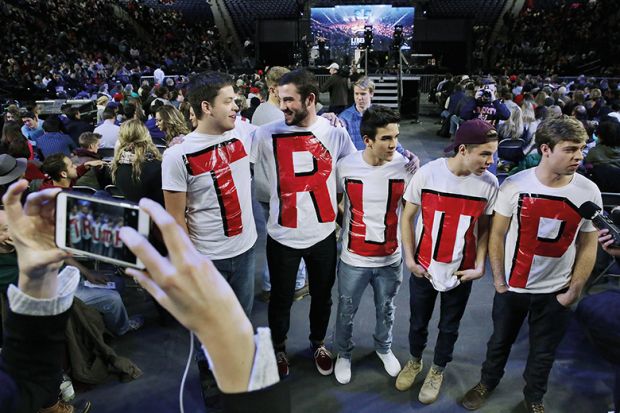Deep divisions in the US Republican party are being mirrored at the collegiate level, with several campus chapters defecting to more hardline offshoots after their own disputed national election.
Republican student groups from at least a dozen states are limiting or cutting their association with the College Republican National Committee (CRNC), the mainstream student-led ally of the national political party.
The alienation in the collegiate ranks arose during the Trump administration, which cultivated its own antagonistic relationship with traditional party conservatives.
The departure of campus chapters has accelerated in the past month, after the incumbent national chair allegedly used procedural manoeuvres to help his preferred successor win by denying voting rights to supporters of her arguably more Trump-friendly opponent.
“We can’t remain in an organisation that devalues the efforts of its members by taking away their rights to vote,” the chairs of 10 state-level chapters wrote to their national leaders after their membership lists were rejected during the election certification process.
The previous national chair, Chandler Thornton, and his elected replacement, Courtney Britt, insisted their organisation followed the rules in turning back a faction they regard as more interested in arguing on Twitter than in pursuing the hard door-to-door work of persuading American voters.
Either way, the dispute has similarities with last year’s US presidential election, which many Trump supporters still regard – without evidence – as having been marred by voting irregularities. And those complaints appear to be further alienating voters overall, as only about a quarter of Americans dispute Joe Biden’s victory last November – a win driven heavily by younger and college-educated voters.
The state chapters disqualified by the CRNC had been largely expected to vote for Judah Waxelbaum, a graduate of Arizona State University (ASU). Mr Waxelbaum has described himself as being wary of pro-Trump extremists but is eager to find ways of bringing them back into the establishment party. Ms Britt branded him as being too close to the extremists.
Arizona and ASU have played central roles in the jostling between the party’s orthodoxy and some breakaways more associated with racial and anti-immigrant hostilities. The state is where pro-Trump forces are still waging their most aggressive and quixotic legal challenge to the 2020 US presidential election, and ASU is where student Republicans in 2018 created a leading pro-Trump splinter group, College Republicans United.
Just ahead of the disputed leadership vote, the CRNC was pushed by Mr Waxelbaum into removing the chair of its Arizona chapter, Alton Zhang of the University of Arizona, over his moves to join College Republicans United. It then reversed Mr Zhang’s expulsion, admitting to a procedural error.
ASU is home to a “very complex” student body, its president, Michael Crow, said in response to questions about the ongoing saga. “Factionalism is the word of the day,” he said.
For others, the dispute was a sad reflection of the state of the party in 2021. “Clearly, the GOP is starting the training for rigging elections in their college division,” Larry Sabato, professor of politics at the University of Virginia, said of the dispute.
Alongside the drama, Professor Sabato noted, college Republicans must confront the serious deficit they face among the nation’s younger generation. Democrats enjoy about twice the level of support of Republicans in the 18-to-29 age range.




